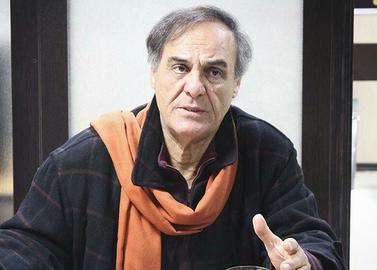An Iranian academic and prominent theater professional has provoked a backlash after he said people from the LGBTQ community “did not observe the cultural sanctity” of an Iranian theater in the capital and called for it to be cordoned off.
Activists and artists soon rallied, releasing a joint statement on Petition condemning artist Ghotboddin Sadegh’s insults, accusing him of hate speech, and urging the public to join their campaign. Seventy activists and artists joined the initial statement, and the petition has so far been signed by 650 people.
Sadegh made the comments as part of an interview with Online Art published on March 8. He described the area around Tehran City Theater as “very shameful” and said it had “turned into a place for thugs, offenders, and homosexuals who do not observe the cultural sanctity of this place." He added: "the private area of the City Theater complex must be defined; shameful things are happening around this building."
The activists’ statement read: "Ghotboddin Sadeghi's stance is a continuation of a policy that criminalizes the life of homosexuals, treats the bisexual society as sick and targets trans people with a call to stigmatize, marginalize and even eliminate this group from society.”
It went on to describe how the perpetuation of taboos and supposed scandals “link every issue and problem, from coronavirus to the vaccine and the insecure urban environment” to the LGBTQ community. The 70 activists said the stigma was routinely used by people hostile to the community “whenever they hit a deadlock” and said that “shouting and complaining in line with the government's policies implicates the LGBTQ community as the main cause or at least one of the causes of social problems.”
The group outlined the dangers of people in academia and the arts speaking out against the LGBTQ community, saying that these people had influence and could shape other people’s perspectives and attitudes in turn.
A Coalition Against Hate
The campaign and accompanying petition were launched by Melika Zar, an LGBTQ activist and one of the people behind the Sheshrang [Six Colors] campaign group, painter and activist Alireza Shojaeian, social analyst and feminist Mina Khani and researcher and artist Yasmin Fahbod.
In an interview with IranWire, Melika Zar described the aim of the statement and the need to protest against hateful remarks. "The purpose of preparing the statement,” Zar said, “and inviting activists from different fields, including artists, experts, and other members of society to sign, is to stand against hate in an environment in which the Islamic Republic systematically suppresses and oppresses people from the LGBTQ community.
“We have to choose whether we want to join the government in this repression or not. Ghotboddin Sadeghi, as a university lecturer and theater director, identifies a problem, not accounting for the corrupt system that is incapable of managing the different issues the country faces, and blames the LGBTQ community as the cause.
“Incidentally, because of censorship and a lack of proper education, LGBTQ people are excluded from family and society, which results in their homelessness and turning to unsafe and high-risk jobs, as well as dropping out of school.
"With this statement, we highlight the system and the oppression that is being inflicted on LGBTQ people, and we urge the public to take a position against hatred and hate speech against people of the Jubaibiyyah (queer) community. It is necessary and important to take such actions and make a collective call and unite against the violation of rights and dehumanization of a group of society. At this juncture, we must clarify our stance against the violation of human rights; in this statement we protest against the humiliation of social groups, including the less privileged social classes."
Teachers Driving Hate in Society
The activists’ joint statement also pointed out that the “anti-human stance” Sadeghi took had a long history, and that groups that had faced discrimination and marginalization would “not forget these conspiracies and silences.”
Painter and activist Alireza Shojaeian has accused people who blame LGBTQ people for societal ills of trying to distract and confuse the public from the real factors at play. "This is one of the most widely-used approaches to avoid the problem,” he said.
“Artists and intellectuals aligning with the government is not a new phenomenon. What is unfortunate is the uncertainty that it creates in the minds of the oppressed community about the role of the intellectuals and artists who also stand as teachers in society."
Shojaeian also highlighted the importance of collective responses to these attitudes. He believes these public campaigns serve as a warning to individuals who want to maintain their reputations as intellectuals.
"To the question of whether art should serve all sections of society, there is no definitive answer. But separating and putting up fences around an area, under the pretext of the sanctity of the place, brings to mind another theory, and that is that here, the main issue is ‘securing’ the area around the nearby mosque and the religious and cultural center of Vali-e-Asr.
“The City Theater, due to its background, has been equated in the public mind with this cleansing. It is obvious to everyone that they have done everything for years to isolate this important building and have adopted a variety of urban policies to degrade its environment. But now is the time to provide a different environment for the City Theater, even under the heavy shadow of their newly-established mosque and religious center."
Related Coverage:
LGBT Iranians Recount the Horrors of "Conversion Therapy"
A Trans Woman's Memory of Harassment and Humiliation in Iran
Three Transgender Iranians Arrested Because of Instagram Posts
visit the accountability section
In this section of Iran Wire, you can contact the officials and launch your campaign for various problems

























comments